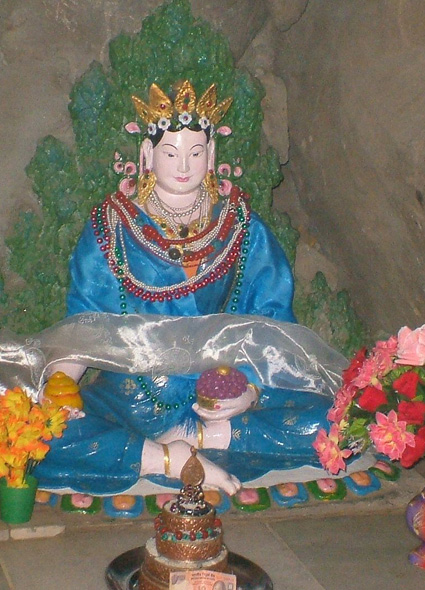Mandarava: Difference between revisions
mNo edit summary |
No edit summary |
||
| Line 1: | Line 1: | ||
[[Image:Mandarava Tso Pema.jpg|frame| | [[Image:Mandarava Tso Pema.jpg|frame|Mandarava; image in the retreat cave above [[Tso Pema]]]] | ||
'''Mandarava''' (Skt. ''Mandāravā'', Tib. [[མནྡཱ་ར་བཱ་]]) — one of the [[five principal consorts of Guru Rinpoche]], she was an emanation of [[Dhatvishvari]] and a princess of [[Zahor]]. After leaving the palace out of disgust for [[samsara]], and joining a nunnery, she met [[Guru Rinpoche]] who gave her teachings. When the king found out, he cast her into a pit of thorns and tried to burn Guru Rinpoche alive. But through his magical powers, Guru Rinpoche transformed the pyre into a [[Tso Pema|lake]]. When the king had repented his actions and granted them pardon, Mandarava accompanied Guru Rinpoche to the [[Maratika cave]], where through their accomplishment of [[long-life practice]], they saw the Buddha [[Amitabha]] face to face and attained the level of a [[vidyadhara with power over life]]. | '''Mandarava''' (Skt. ''Mandāravā'', Tib. [[མནྡཱ་ར་བཱ་]]) (8th cent.) aka '''Machik Drubpai Gyalmo''' — one of the [[five principal consorts of Guru Rinpoche]], she was an emanation of [[Dhatvishvari]] and a princess of [[Zahor]]. After leaving the palace out of disgust for [[samsara]], and joining a nunnery, she met [[Guru Rinpoche]] who gave her teachings. When the king found out, he cast her into a pit of thorns and tried to burn Guru Rinpoche alive. But through his magical powers, Guru Rinpoche transformed the pyre into a [[Tso Pema|lake]]. When the king had repented his actions and granted them pardon, Mandarava accompanied Guru Rinpoche to the [[Maratika cave]], where through their accomplishment of [[long-life practice]], they saw the Buddha [[Amitabha]] face to face and attained the level of a [[vidyadhara with power over life]]. | ||
==Further Reading== | ==Further Reading== | ||
*Padmasambhava, ''The Lives and Liberation of Princess Mandarava'', translated by Lama Chonam and Sangye Khandro | *[[Padmasambhava]], ''The Lives and Liberation of Princess Mandarava'', translated by Lama Chonam and Sangye Khandro (Boston: Wisdom Publications, 1998) ISBN 0861711440 | ||
==External Links== | |||
*[http://treasuryoflives.org/biographies/view/Mandarava/9 Biography at Treasury of Lives] | |||
[[Category:Historical Masters]] | [[Category:Historical Masters]] | ||
[[Category:Female Masters]] | [[Category:Female Masters]] | ||
[[Category:Guru Rinpoche]] | [[Category:Guru Rinpoche]] | ||
Revision as of 16:06, 12 January 2012

Mandarava (Skt. Mandāravā, Tib. མནྡཱ་ར་བཱ་) (8th cent.) aka Machik Drubpai Gyalmo — one of the five principal consorts of Guru Rinpoche, she was an emanation of Dhatvishvari and a princess of Zahor. After leaving the palace out of disgust for samsara, and joining a nunnery, she met Guru Rinpoche who gave her teachings. When the king found out, he cast her into a pit of thorns and tried to burn Guru Rinpoche alive. But through his magical powers, Guru Rinpoche transformed the pyre into a lake. When the king had repented his actions and granted them pardon, Mandarava accompanied Guru Rinpoche to the Maratika cave, where through their accomplishment of long-life practice, they saw the Buddha Amitabha face to face and attained the level of a vidyadhara with power over life.
Further Reading
- Padmasambhava, The Lives and Liberation of Princess Mandarava, translated by Lama Chonam and Sangye Khandro (Boston: Wisdom Publications, 1998) ISBN 0861711440